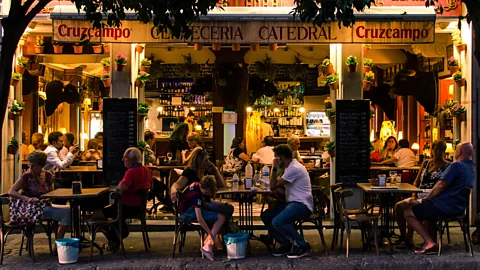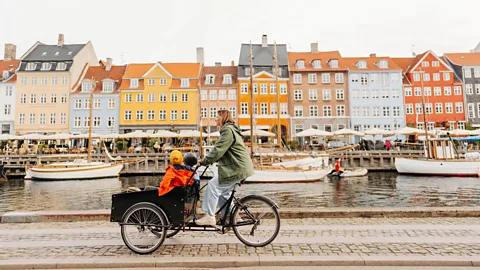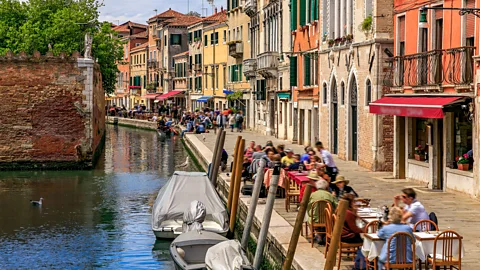Five countries with the best work-life balance
 Sascha B/Getty Images
Sascha B/Getty ImagesFor anyone considering an international move, it's important to understand a country's attitudes towards work – and whether it prioritises work-life balance.
Work-life balance is often seen as the key to everything from a healthy lifestyle to psychological wellbeing. So, it's little surprise that for anyone considering an international move, it's important to understand a country's attitudes towards work.
To figure out which nations have the best work-life harmony, we looked at the 2023 Global Life-Work Balance Index by HR-tech company Remote, which takes into account aspects such as statutory annual leave, minimum statutory sick pay percentage and amount of paid maternity leave. We also looked at the OECD's work-life balance data, which analyses how many hours employees work and how much time people devote to leisure and personal care in its 22 member countries.
Here are five of the top-ranking countries:
New Zealand
New Zealand leads Remote's ranking, with 26 paid weeks of maternity leave, boosted by having a relatively high minimum wage, 32 days of statutory annual leave and a minimum 80% statutory sick pay percentage.
But more than any particular policy, it's the overall culture that makes work a more relaxed affair, says Erin Parry, a Canadian who lives in New Zealand and works in marketing.
"As a Canadian, you have such a 'do-or-die' attitude about work," she said. "I just did not know how I was going to survive that." When she visited New Zealand in 2015, it seemed to offer a different approach – one that, ever since moving there permanently the same year, has largely lived up to expectations.
Of course, New Zealand isn't perfect. OECD data shows that 14% of employees work more than 50 hours per week, more than the OECD leave average of 10%. And they spend slightly less time than the OECD average, 14.9 hours per day, on personal care (like eating and sleeping) and leisure (including spending time with family and friends, hobbies and watching television). Parry points out that some of the government support that other wealthy countries offer, such as worker insurance in case of unemployment aren't provided by New Zealand, while childcare costs are high and on the rise.
Plus, New Zealand's relaxed approach to work can also have drawbacks. "If you are trying to get something done and you have any urgency, that's just too bad for you," Parry said. "The month of December is a write-off; nothing really happens. People don't respond to their emails."
Still, says Parry, New Zealand's cultural approach to work-life balance is hard to beat. "People's main priorities are their family, their wellbeing, recreation, travel," she said. "They really take their time as very valuable and very precious and believe that work is a means to an end – and not your whole life."
 AndreaMPhoto/Getty Images
AndreaMPhoto/Getty ImagesSpain
Spain ranks second on the Remote index, thanks to benefits like its 26 days of statutory annual leave. According to the OECD data, meanwhile, workers in Spain devote the most hours of their day to leisure and personal care outside of any country but Italy and France. Only 2.5% work very long hours in paid employment.
That doesn't come as a surprise to Isabelle Kliger, a travel writer who has lived in Sweden, the UK, Ireland and – since 2010 – Barcelona. "In the UK and Ireland, so many people spend all their time at work, and then when they're not working, they're socialising with their colleagues," she said.
Top 10 countries for work-life balance, according to the OECD:
1. Italy
2. Denmark
3. Norway
4. Spain
5. Netherlands
6. France
7. Sweden
8. Germany
9. Russia
10. Belgium
Not so in Spain. "You meet people here and they don't immediately ask you what you do. And they don't talk about work outside of work," she explained. "Maybe, if you meet someone for a drink straight from work, they might be like, 'I had the worst day.' And then, within 10 minutes, you're talking about something else.
Still, she says that it's common to hear the Spanish say that they work very long hours. Some of this is because of how work hours have changed. Previously, the traditional workday was from about 08:30 to 13:30, with a one- or two-hour siesta, ending at 19:00 or 20:00. But the siestahas been in decline for years. As a result, some workers were no longer taking that midday break but still staying at the office late. To combat this shift, in 2016 Spain's then-prime minister made headlines by announcing that he wanted to see workdays end at 18:00, instead.
Even so, recent EU data finds that the Spanish work, on average, 37.8 hours a week – only about 20 minutes more than the European average. For those companies that do still practice long lunch breaks, during the summer, there is a common Friday tradition called jornada intensiva: in lieu of the lunch break, staffers leave the office at 15:00.
The upshot, says Kliger, is a culture that – to her – has its priorities in order. "You don't live to work," she said. "You work to live."
 AleksandarNakic/Getty Images
AleksandarNakic/Getty ImagesDenmark
Few people understand the benefit of Denmark's work-life balance more than Helen Russell, author of The Year of Living Danishly – and who now has lived in the country for more than a decade.
Top 10 countries for work-life balance, according to Remote:
1. New Zealand
2. Spain
3. France
4. Australia
5. Denmark
6. Norway
7. Netherlands
8. UK
9. Canada
10. Brazil
"I worked as a journalist in London for 12 years," she said. "I worked long hours. It was busy. With the commute from London, there was often very little of 'life' in the work-life balance part left over. I just thought that was normal. And then we moved here."
Among other things, she says, she noticed how strict the boundary between "work" and "life" is. "The working day starts at 08:00. People normally shut their computers at 16:00," she said. Because children usually have to be picked up from nursery by around 16:00, everyone – even those without children – end their workday then. "There's really a sacred family time between, say, 16:00 and 19:00 each day, where families are together. Maybe you answer a few emails once the kids are in bed, but otherwise, you're kind of done. And it means that people without children as well are allowed to set aside their own leisure time and hobbies with the same priority that parents are afforded to their children. It's perfectly acceptable to put in your diary, 'I must go to the gym', or 'I've got badminton club'."
This prioritisation of work-life balance is what the OECD and Remote rankings found, too. Just 1% of Danish employees work more than 50 hours a week, far less than countries including Italy (3%) or than the OECD average (10%). They also devote 15.7 hours a day to personal and leisure time, more than the OECD average. And flexible work is supported – in fact, the country's Flexjobs scheme, in which workers can request different work hours, patterns or even less physically demanding tasks, was launched back in 1998.
The country also offers 36 days of statutory annual leave, among the highest of wealthy countries, and workers must be paid 100% of their wages for sick days.
 Massimo Borchi/Getty Images
Massimo Borchi/Getty ImagesFrance
According to OECD data, people in France have 16.2 hours per day for personal and leisure time, second only to Italy. On the Remote list for work-life balance, the country ranks third overall – with one of the highest number of days for statutory annual leave (36), in particular.
Indeed, even in a busy city like Paris, says Sarah Micho, a Canadian entrepreneur and freelancer who moved to the capital in 2021, locals prioritise non-work time. "French culture promotes a sense of relaxation and rest," she said. Cafe culture is one example: it's common to see people sitting and relaxing outside at any hour of the day, she says, particularly when the weather is nice – and not just with friends or colleagues, but having a leisurely coffee alone, too.
More like this:
Of course, it still depends on the industry and the role, she says. Micho did a fashion industry internship where her hours were 10:00 to 19:00 – and many other people were commuting home at that time too. In fact, 8% of employees in France work more than 50 hours per week, lower than the OECD average of 10%, but still higher than many other top-ranked countries.
But in general, the approach is one of balance, Micho says, with an emphasis on culture, and France's prioritisation of arts and culture funding making a difference. "That also helps provide a balance from your busy work life. On the metro you see expos coming up, or events that are advertised," she said. "There's more of that sense of having a life outside of your job."
 Fani Kurti/Getty Images
Fani Kurti/Getty ImagesItaly
The popular Italian phrase il dolce far niente (the sweetness of doing nothing) isn't just lip service – as I experienced while living in Rome. "I think Italians invented the concept of work-life balance," agreed Andres Uribe-Orozco, an attorney who now works in Rome after living in Colombia and the US. "People are not just constantly running around like headless chickens for 'work, work, work'."
The OECD data bears this out. Full-time employees spend 69% of their day – 16.5 hours – on personal care and leisure. That's 1.5 hours more than the OECD average, making it the OECD country where people have the most leisure time. Meanwhile, while 10% of OECD employees work very long hours (more than 50 hours a week), in Italy, only 3% do.
"People think Italians don't work. No – Italians work a lot. They're just productive," said Uribe-Orozco. "They do what they have to do, and they do it quickly so they can enjoy their long coffee pauses."
Of course, there are downsides. The country has higher unemployment and lower average salaries than many other OECD countries, for example. Italy also fares far worse – ranking at number 22 – on Remote's work-life balance list, which takes into account aspects like overall happiness index and LGBTQ+ inclusivity.
The lack of a hustle culture can impact everyday efficiency, too. When I lived in Italy, I would pencil out at least an hour for a visit to the post office, while any kind of bureaucracy, like renewing a permit, would easily be a half-day affair. The upside? Rather than seeing it as "lost" time, I started to view it as potential leisure time, always making sure I had a good book with me – and in that way I, too, wound up discovering il dolce far niente even in the unlikeliest of circumstances.
Living In is a series from BBC Travel that discovers what it's like to reside in some of the world's top destinations.
---
Join more than three million BBC Travel fans by liking us on Facebook, or follow us on Twitter and Instagram.
If you liked this story, sign up for The Essential List newsletter – a handpicked selection of features, videos and can't-miss news delivered to your inbox every Friday.
